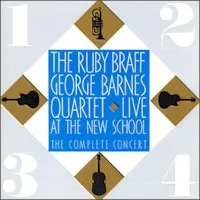Album: For The Last Time Disc 1
Styles: Cornet And Saxophone Jazz
Year: 2009
File: MP3@320K/s
Time: 59:32
Size: 137,1 MB
Art: Front
(12:15) 1. Sometimes I'm Happy
( 4:57) 2. Why Shouldn't I'
(12:24) 3. Just You, Just Me
(15:58) 4. I Want a Little Girl
(13:56) 5. Rockin' Chair
Styles: Cornet And Saxophone Jazz
Year: 2009
File: MP3@320K/s
Time: 59:32
Size: 137,1 MB
Art: Front
(12:15) 1. Sometimes I'm Happy
( 4:57) 2. Why Shouldn't I'
(12:24) 3. Just You, Just Me
(15:58) 4. I Want a Little Girl
(13:56) 5. Rockin' Chair
Ruby Braff's discographer Thomas P. Hustad addresses the concern posed by this album in his liner notes when he speaks of the "trepidation" with which "we tend to approach any musician's final recording." Tenor saxophonist Scott Hamilton, whose contribution approaches Braff's own, had his own hesitations, based on his unhappy memories of the gig, at the Nairn Jazz Festival in Scotland, as Braff, suffering from the emphysema that would kill him six months later, required a fan on-stage to help his breathing. But Hamilton withdrew his objections when he actually heard the recording, which shows little evidence of the leader's infirmity. It gives plenty of evidence of a group of sympathetic musicians accustomed to playing together, taking their orders from Braff, who seems to call for the solos and also decide when they're finished.
Everybody in the six-piece band takes those solos, as the tunes extend out to ten or even 15 minutes each. Probably, that allows time for Braff to gather himself for his own playing, but when he steps in, he is his usual self, coming up with interesting variations on the melodies of familiar standards. The best moments, though, are when Braff and Hamilton, his longtime protégé, play together at the openings of such songs as "Dinah," "Yesterdays," and "The Man I Love," with Hamilton coming up with counter-melodies. At such times, this doesn't come off as Braff's last night on-stage; it seems like just another great show in a storied career. By William Ruhlmann https://www.allmusic.com/album/for-the-last-time-mw0000801881
Musicians: Ruby Braff-cornet, Scott Hamilton-tenor saxophone, Jon Wheatley-guitar, John Bunch-piano, Dave Green-bass, Steve Brown-drums
Everybody in the six-piece band takes those solos, as the tunes extend out to ten or even 15 minutes each. Probably, that allows time for Braff to gather himself for his own playing, but when he steps in, he is his usual self, coming up with interesting variations on the melodies of familiar standards. The best moments, though, are when Braff and Hamilton, his longtime protégé, play together at the openings of such songs as "Dinah," "Yesterdays," and "The Man I Love," with Hamilton coming up with counter-melodies. At such times, this doesn't come off as Braff's last night on-stage; it seems like just another great show in a storied career. By William Ruhlmann https://www.allmusic.com/album/for-the-last-time-mw0000801881
Musicians: Ruby Braff-cornet, Scott Hamilton-tenor saxophone, Jon Wheatley-guitar, John Bunch-piano, Dave Green-bass, Steve Brown-drums
Album: For The Last Time Disc 2
Time: 55:41
Size: 128,3 MB
(10:29) 1. Dinah
(13:08) 2. Yesterdays
(15:42) 3. The Man I Love
( 6:31) 4. The Man With a Horn
( 9:49) 5. Indiana




















